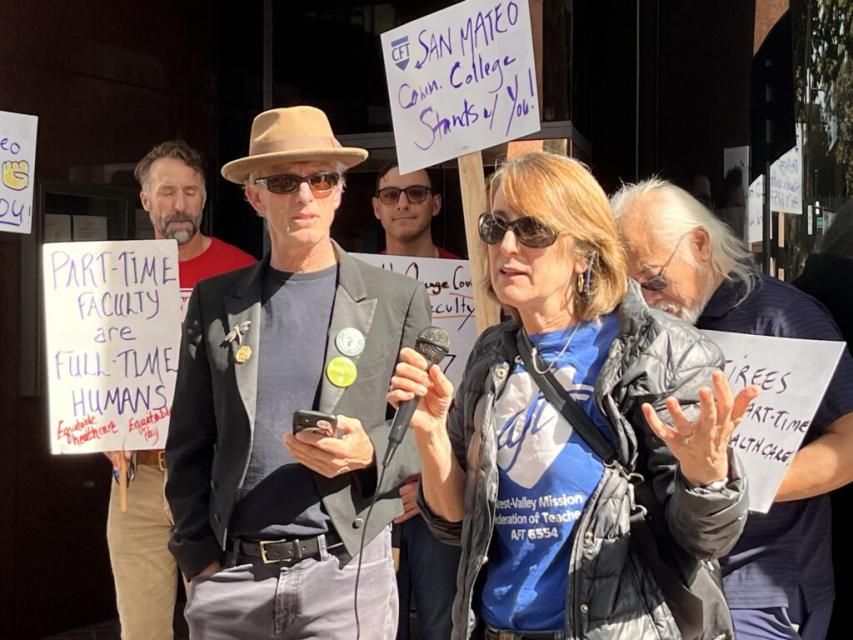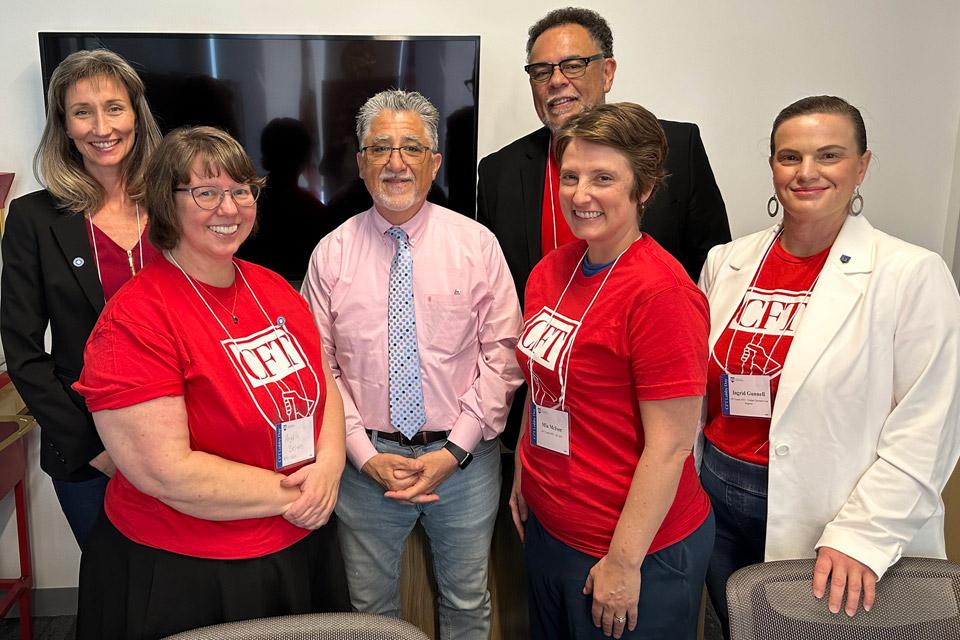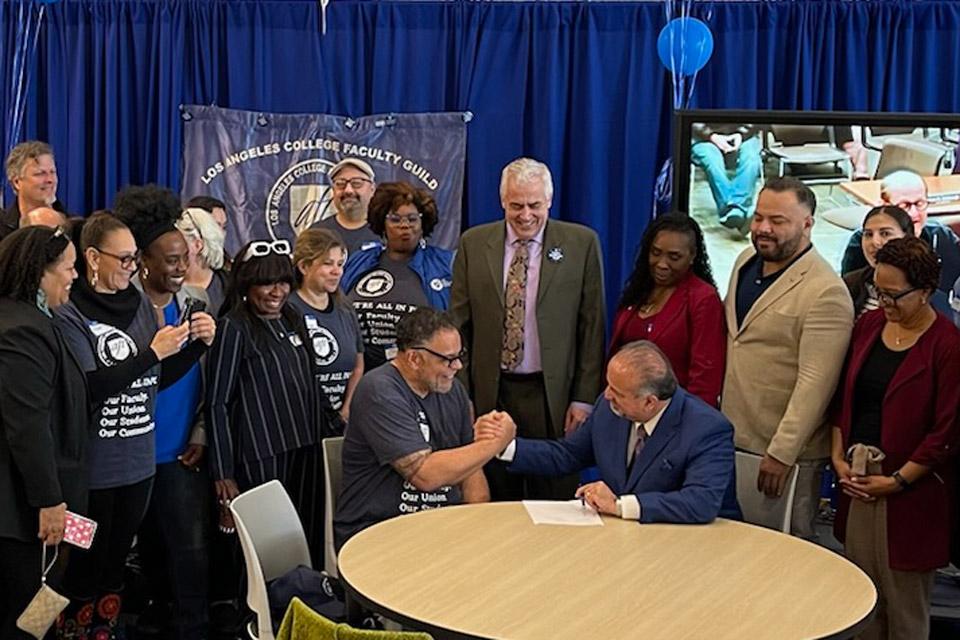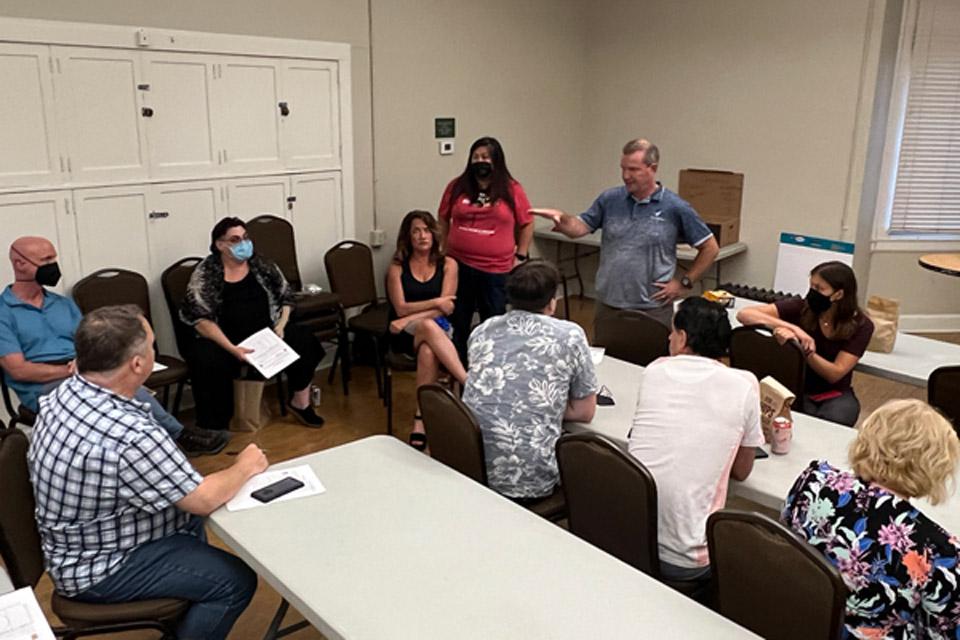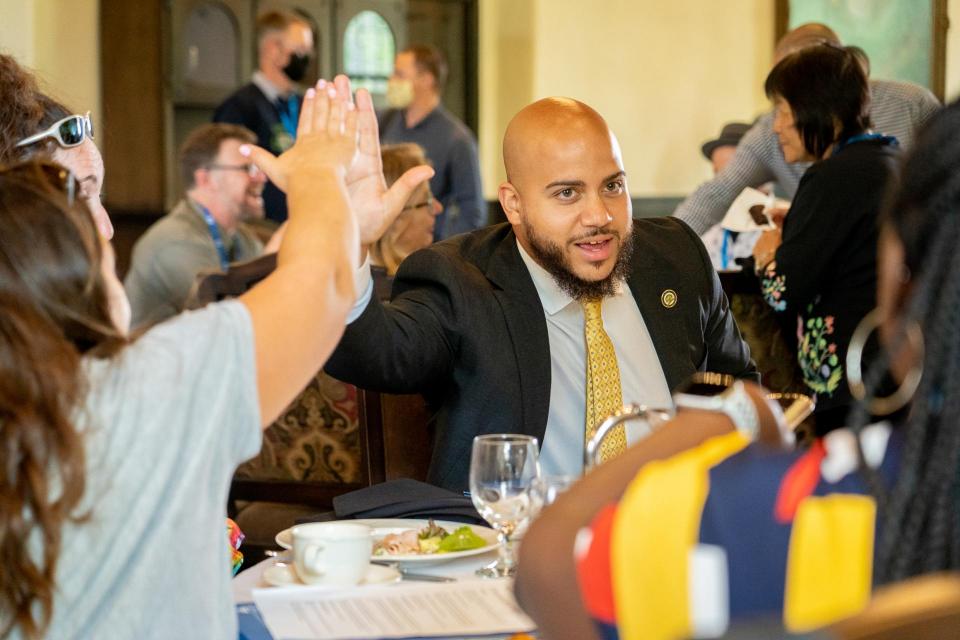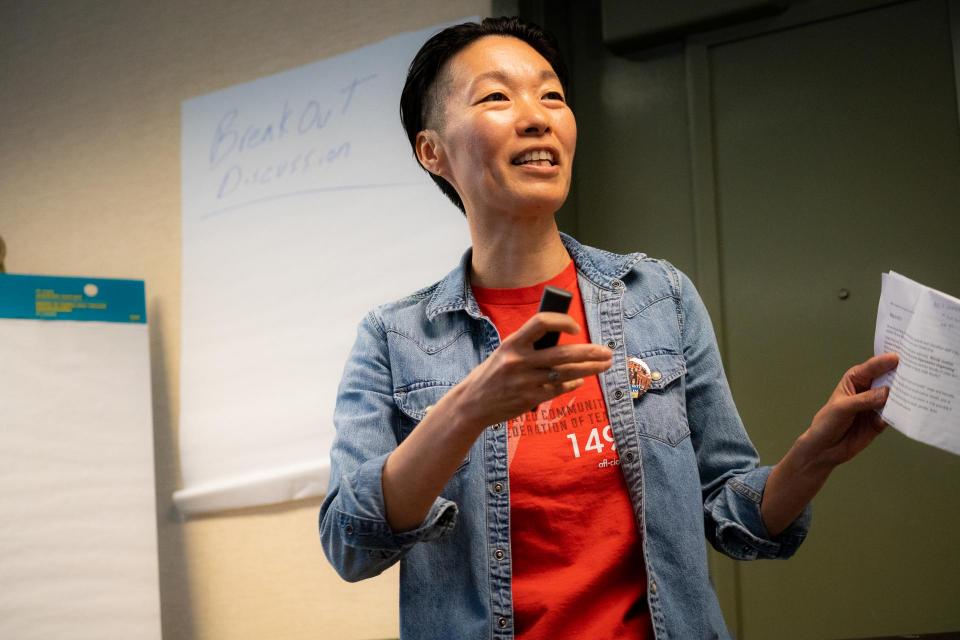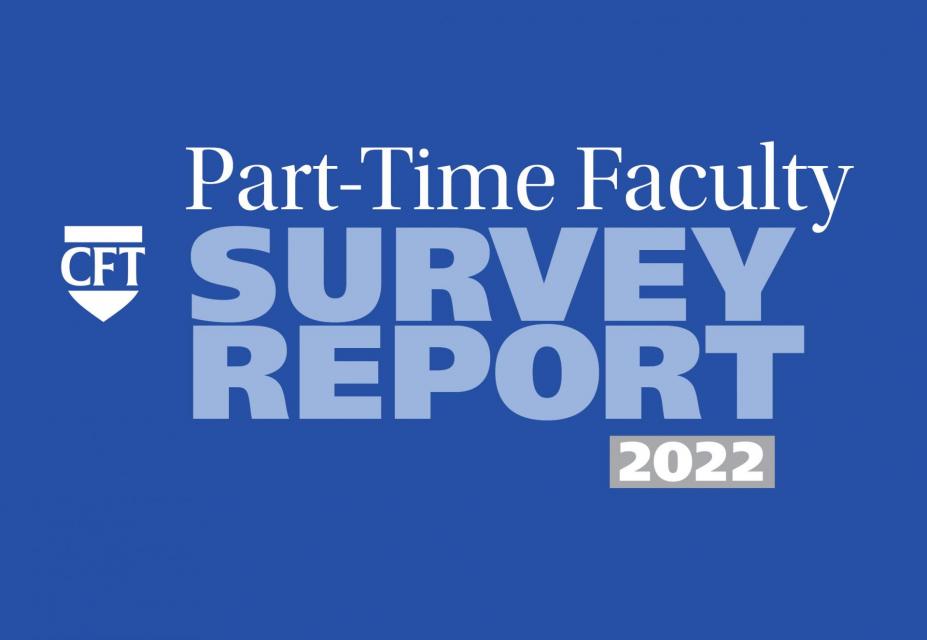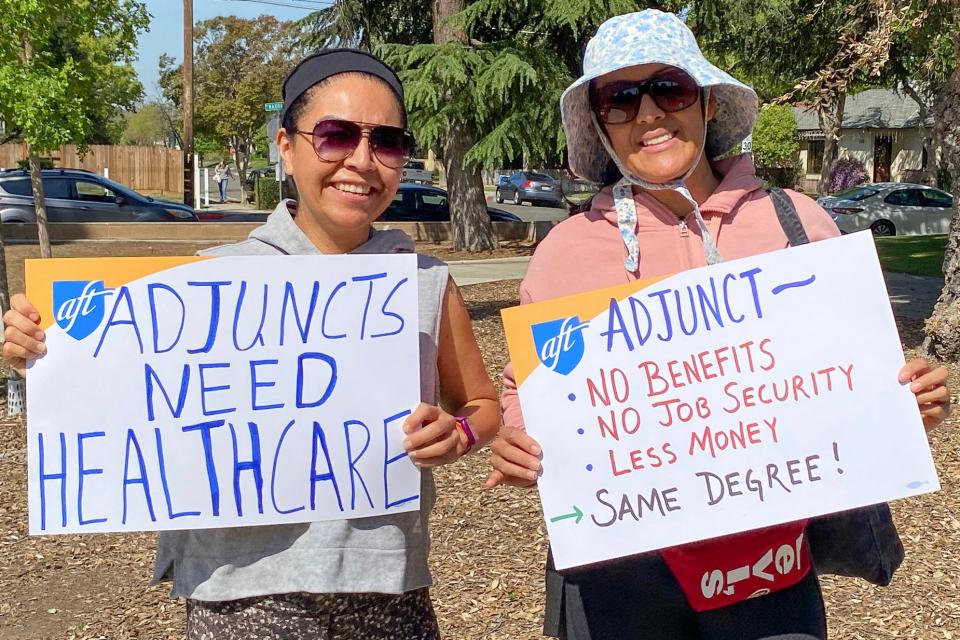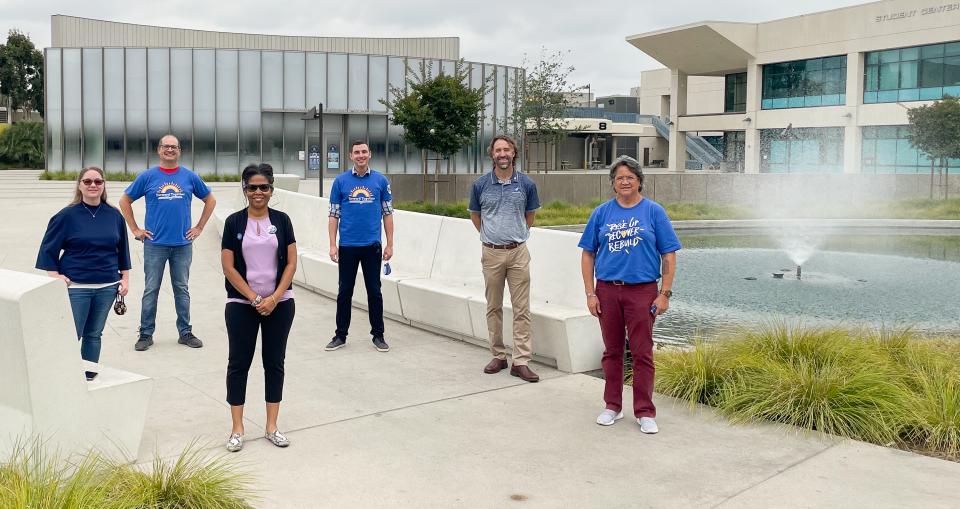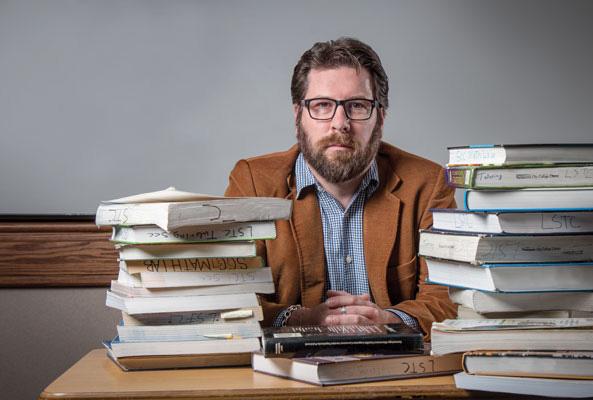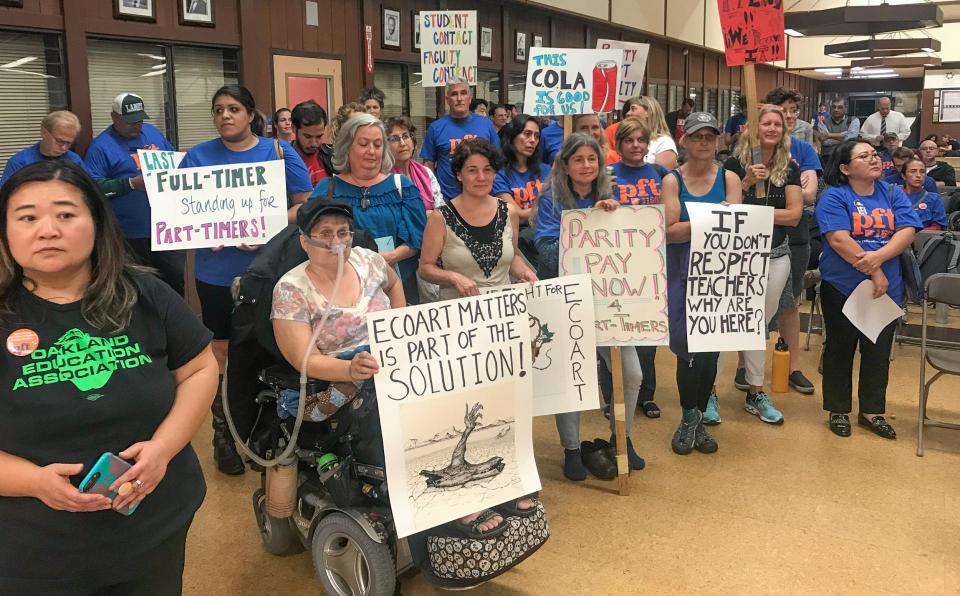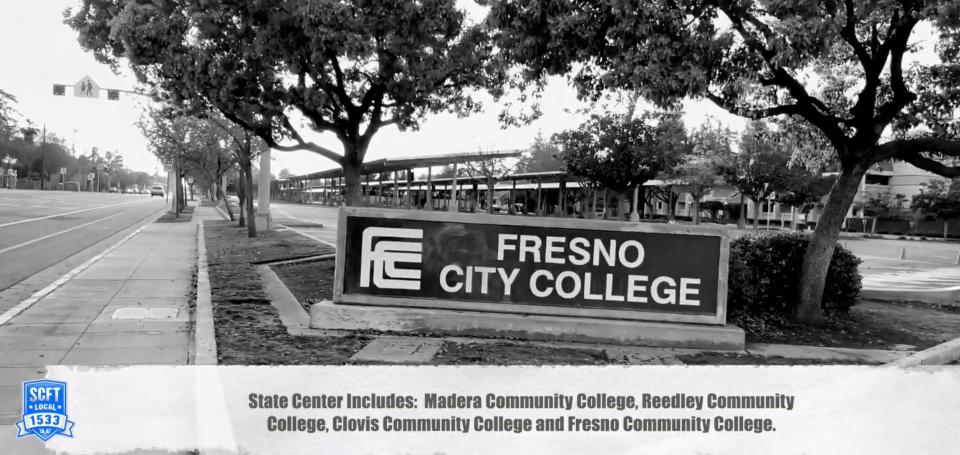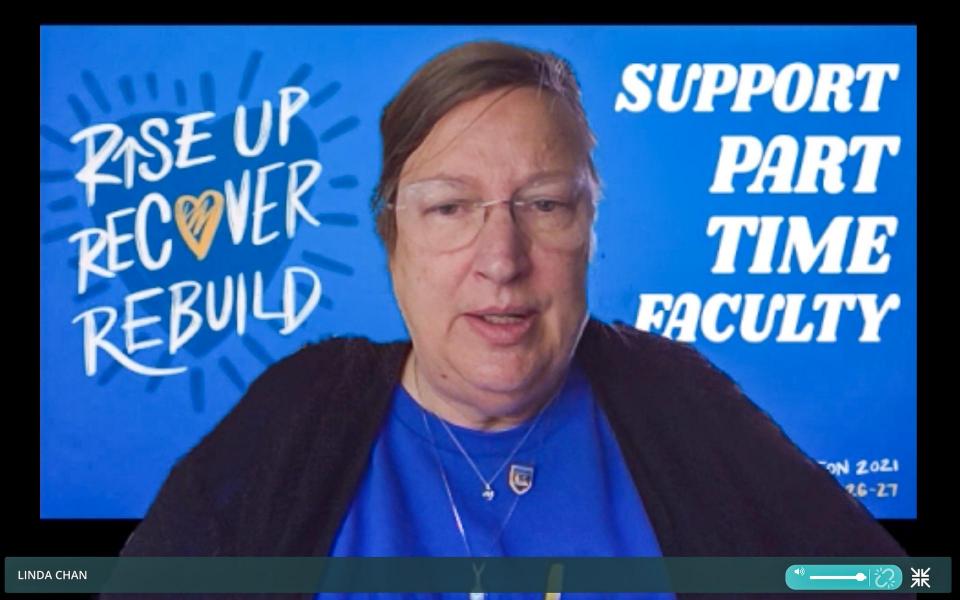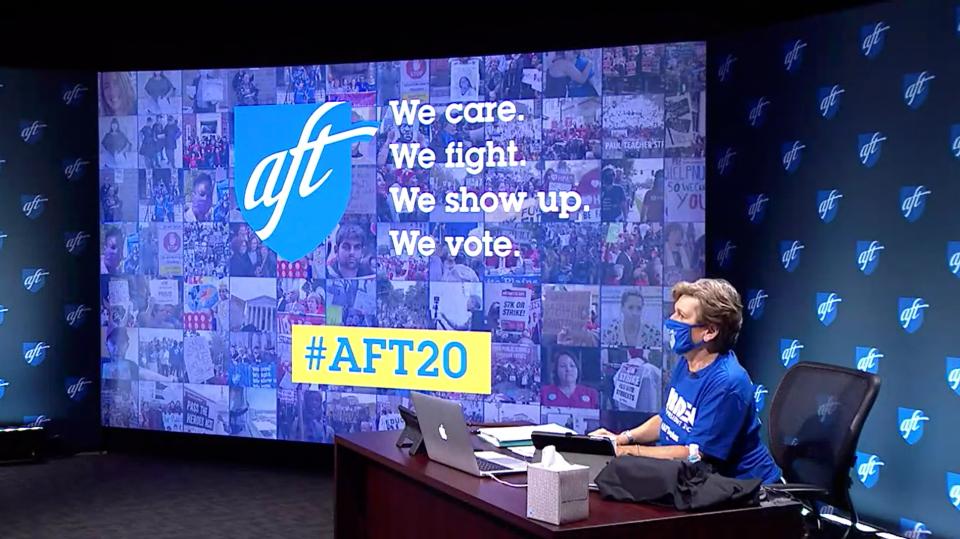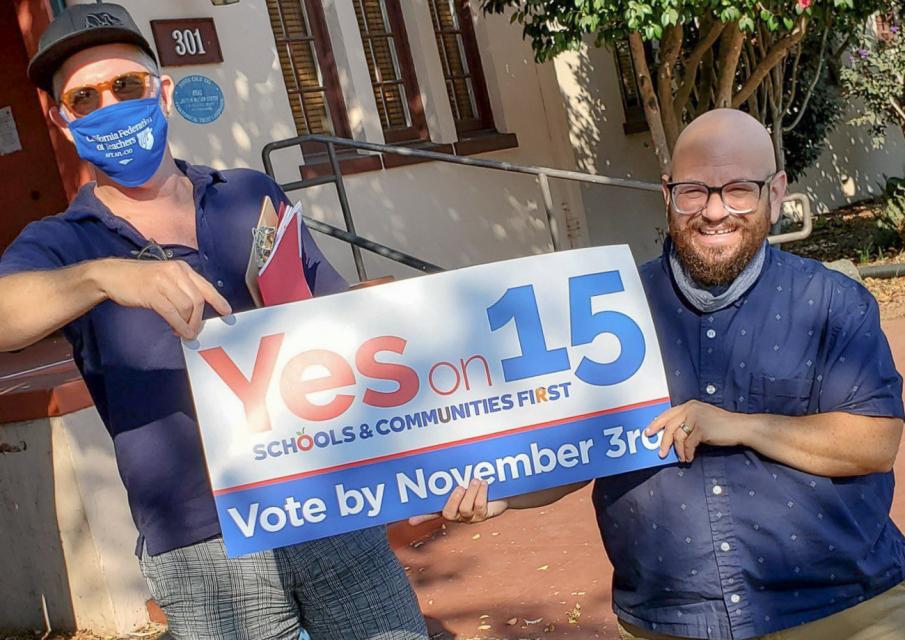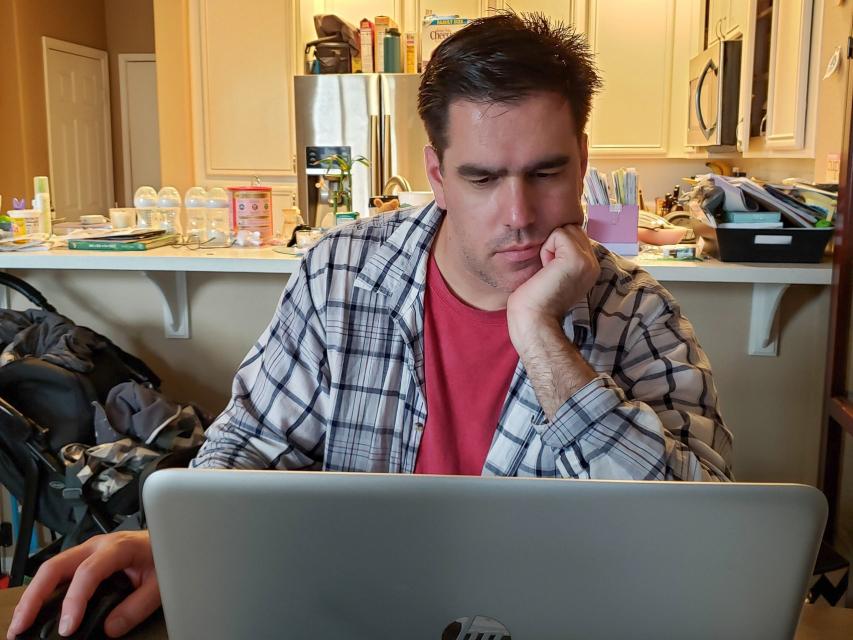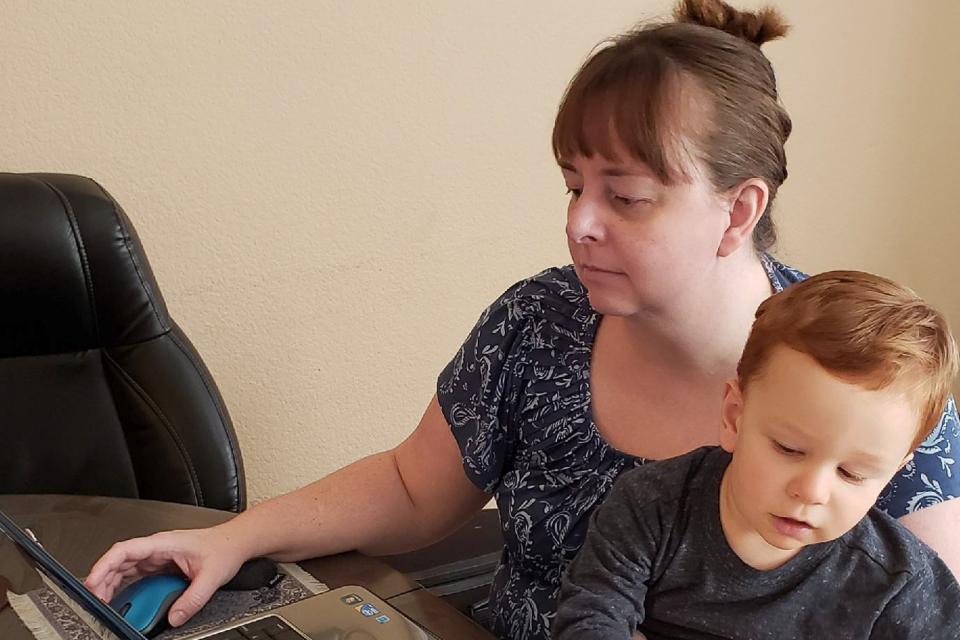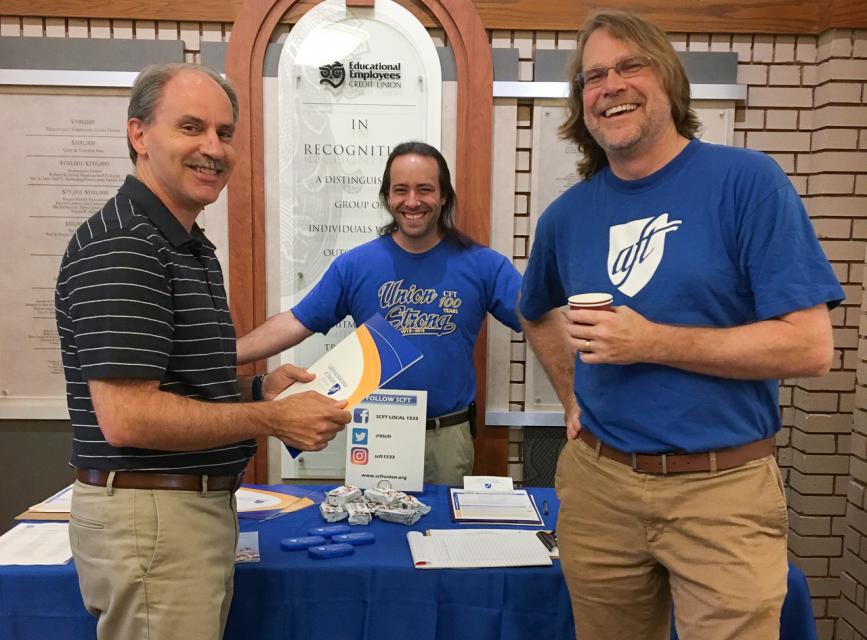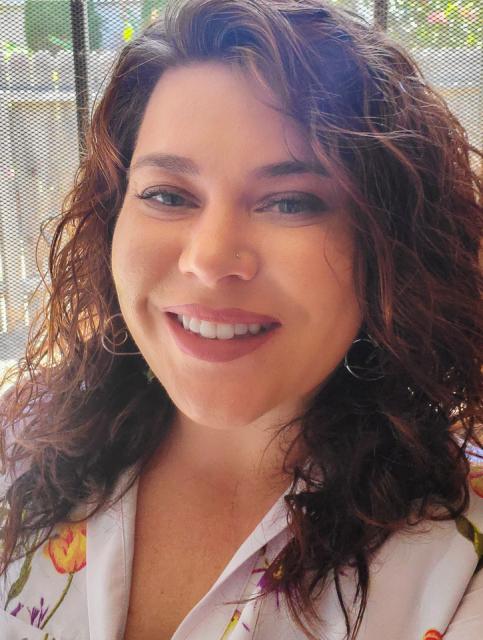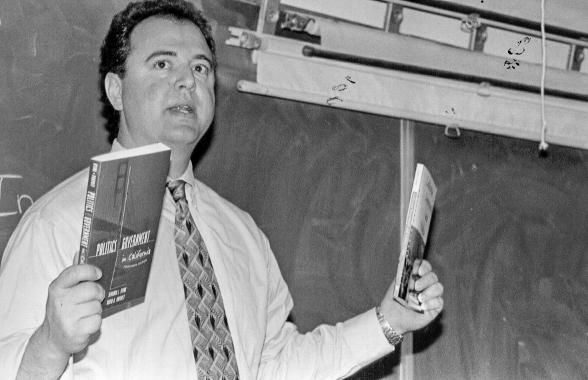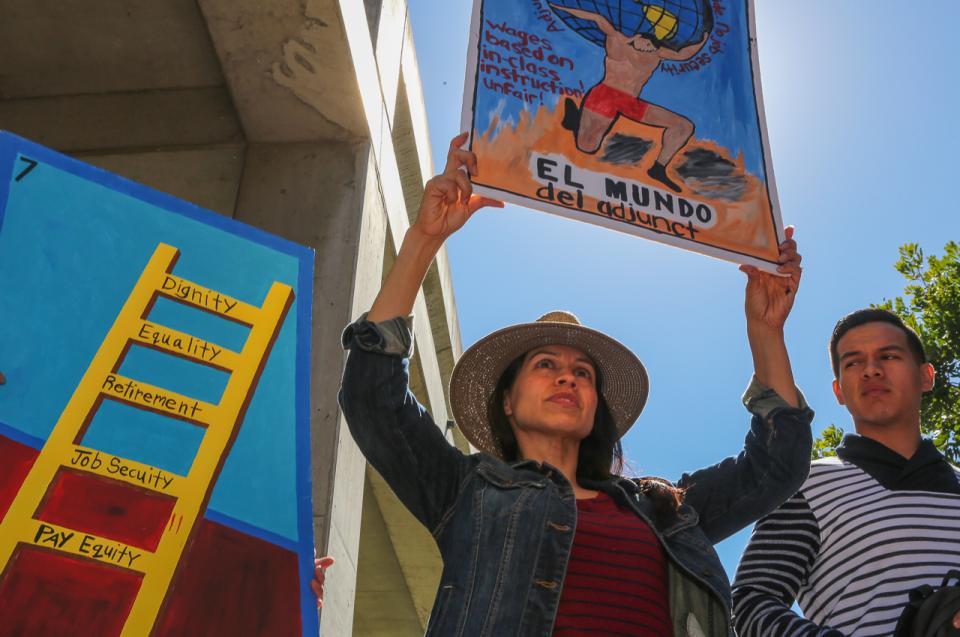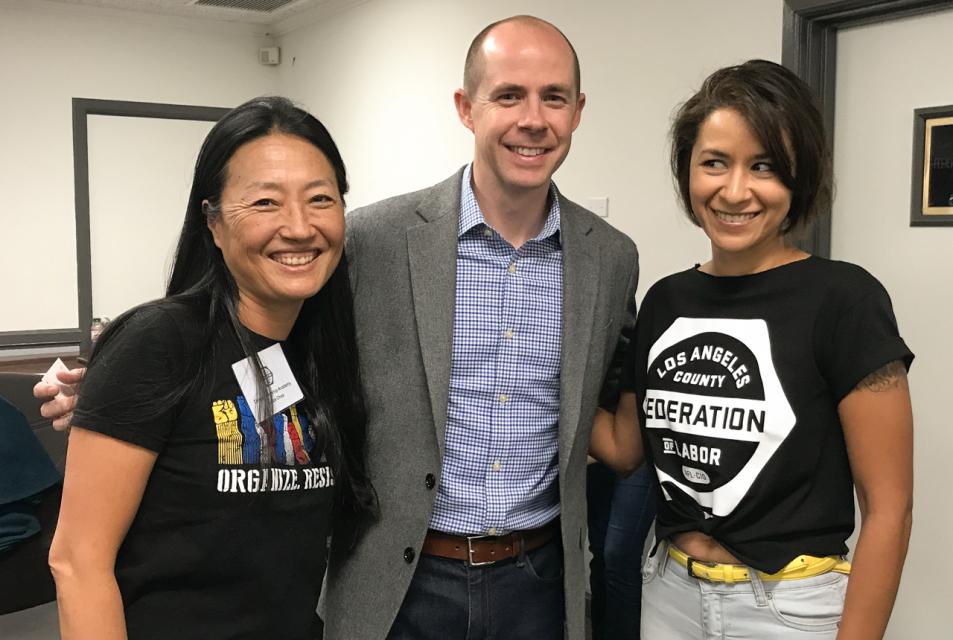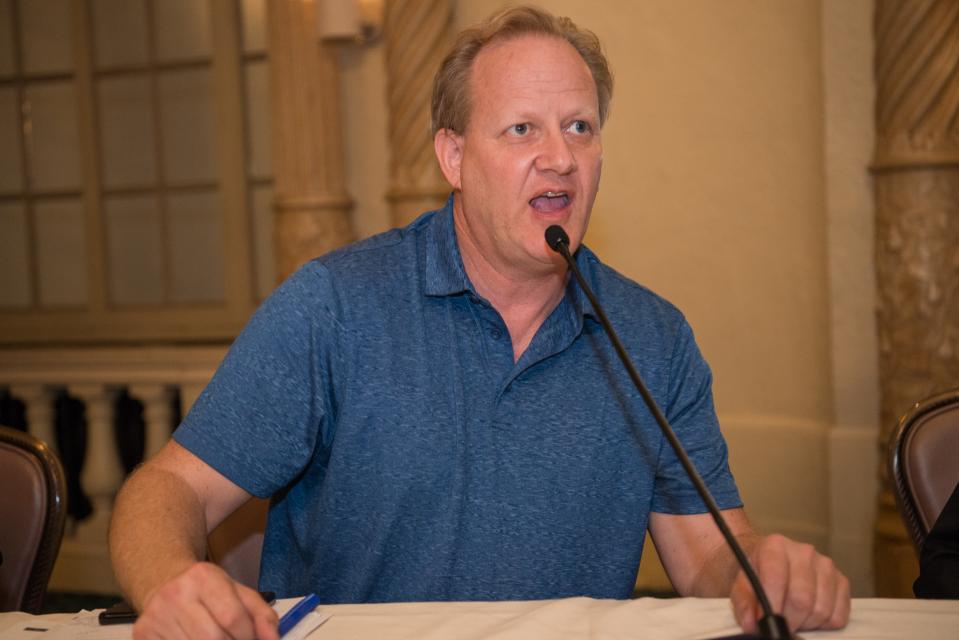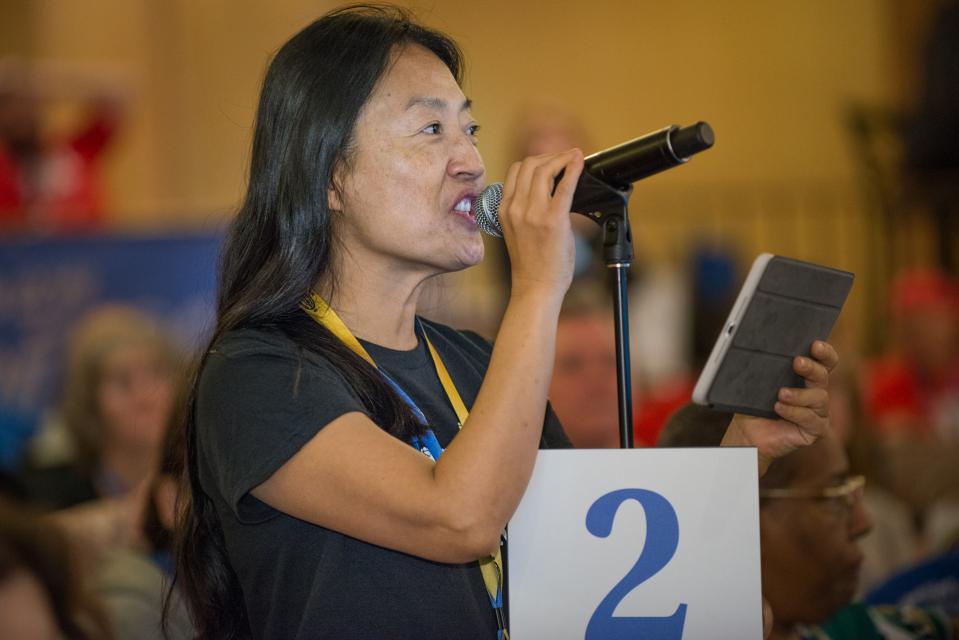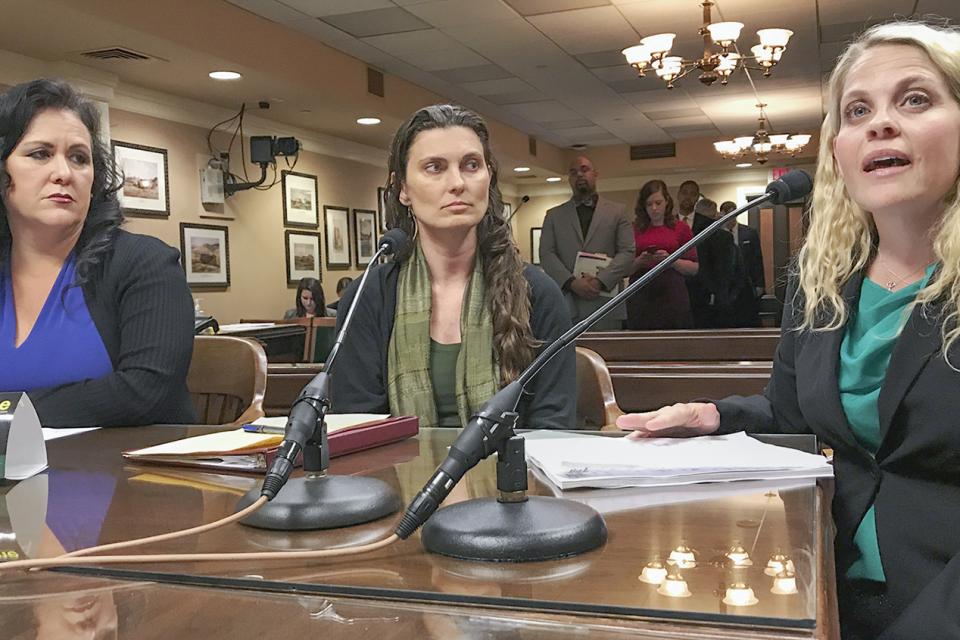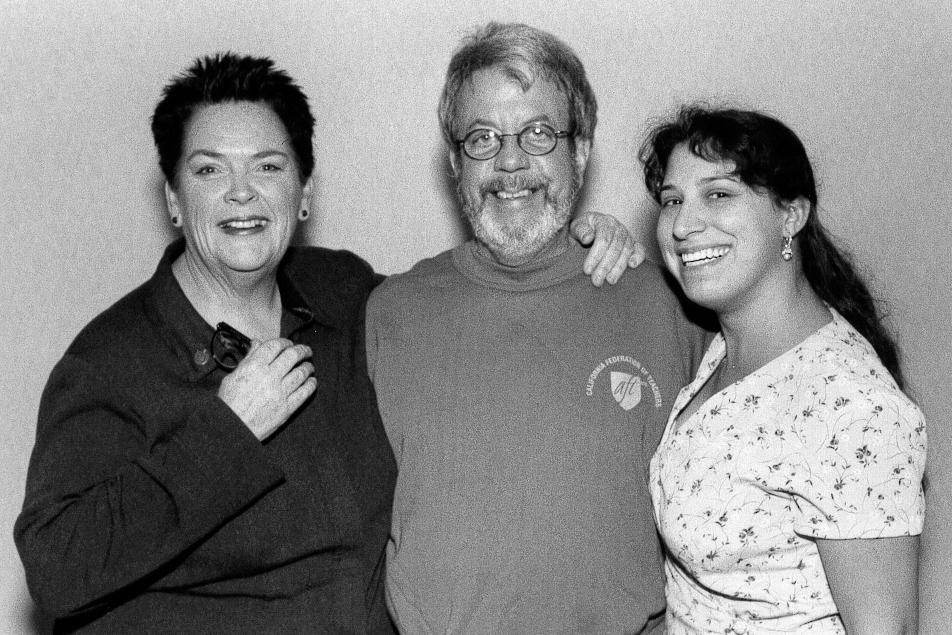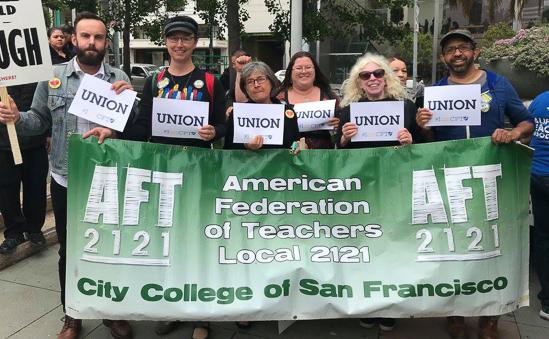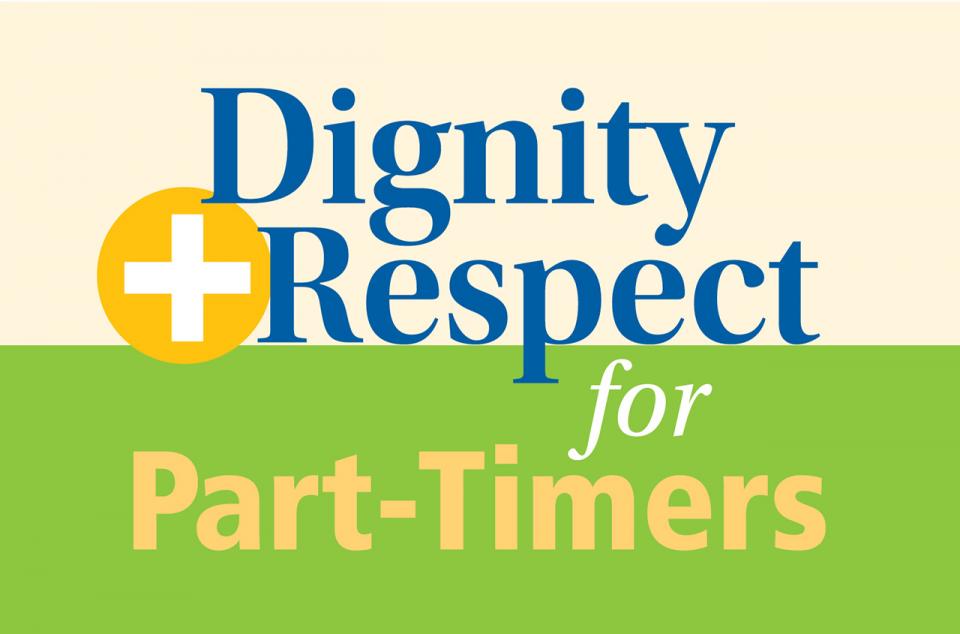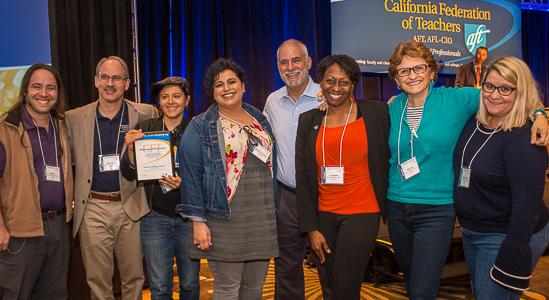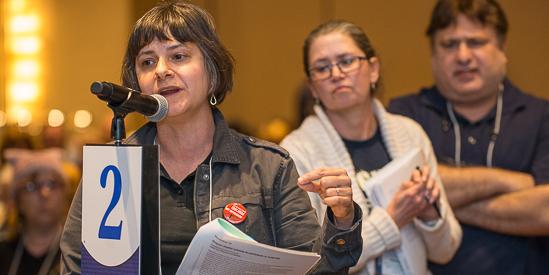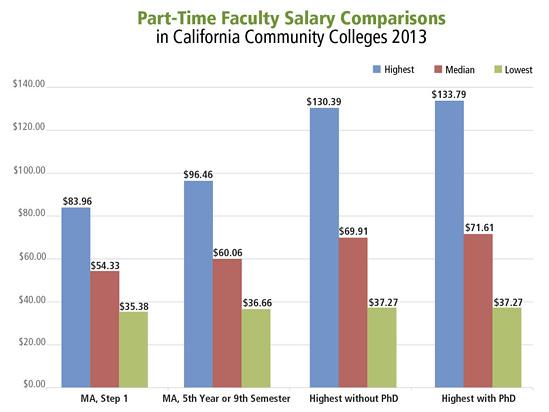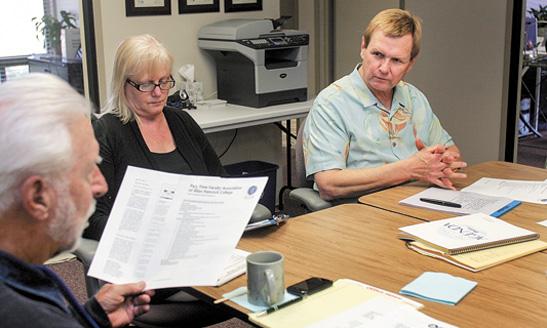Part-Timer
Lives Transformed by CFT’s Part-time Healthcare Campaign
To date, 14 CFT locals have secured AB 190 Option 1 programs (Full-time faculty equivalent healthcare for Part-time faculty working over 40% of a full-time load).
These CFT local union part-time successes have both saved and changed lives for the better.
CFT Pushes Forward on a Vision of a One-Tier/Unified Faculty Model
CFT’s One-Tier Task force and CFT members, after over eight months of discussion, has created a definitive list of basic components deemed essential for what a one-faculty model should look like in the California community college system.
The work is the result of a team of core community college union leaders and activists, composed equally of both part and full-time members.
Bittersweet Legislative Year for CFT Part-time Faculty
Bittersweet would best describe the end results of the 2022-2023 legislative season for community college part-time faculty.
One of the clear positives was the realization of a record 8.22% cost-of-living allowance for California Community Colleges, up .09% from Governor Newsom’s initial proposal of an 8.13% COLA in January. The COLA followed off a fairly robust COLA of 6.56% in 2021-2022.
Part-time Faculty Healthcare Precarity in Two Profiles
A summer vacation and the birth of a child should create happy memories, but for Trevor Krapf and Jennifer Wu, the reality of being part-time and having tenuous healthcare turned both their experiences into financially tragic near misses.
Part-time Healthcare: CFT Locals in the Fight for What’s Morally Right
One year out from the historic passage of AB 190 (the state budget bill for that year), many CFT locals have been successful in securing full-time equivalent medical coverage for their part-time members, while others remain engaged in awakening the moral consciences of their admin and local boards of trustees to do the right thing.
One Tier Task Force Getting Down to Business
Since this past May, CFT’s One Tier task force has been in serious discussions to find solutions to the overuse and exploitation of part-time higher education faculty. This task force was created based on the resolution at the 2023 CFT Convention.
Following healthcare victory, CFT pursuing new legislative agenda in Sacramento
Following up on our major healthcare victory last year, this year CFT is moving forward in its legislative efforts to improve part-time faculty working conditions and job opportunities.
Speaking truth to power: part-time advocacy at CFT Lobby Day
Progress on part-time issues is not something accomplished only through local organizing and negotiating, but also through direct part-time member legislative advocacy. This year, faculty drove this progress through their advocacy at CFT’s April 26 Lobby Day in Sacramento.
Part-time community college CFT members, most clad in red and wearing jeans as a show of solidarity with Denim Day, were joined that day by dozens of fellow CFT members, including UC-AFT Lecturers, K-12 faculty and staff, and Pre-K, and Early Childhood educators, and retirees.
From north to south, CFT locals win healthcare for part-time faculty
Following CFT’s historic victory to secure $200 million annually in ongoing state funding for community college part-time faculty healthcare, the campaign’s next phase has moved to the bargaining table.
At press time fourteen districts have made agreements to offer healthcare to part-time faculty, with part-timers in twelve of those districts represented by CFT locals. Four of the most recent successes were at the San Francisco, West Valley Mission, Los Angeles, and North Orange Community College Districts. These are the stories of their success.
CFT task force to end the two-tier system in the community colleges convenes
Convening around a bold vision of total systemic reform, CFT has formed a task force that will take a deep dive into our state’s community colleges and develop a strategic plan to end the two-tier faculty system.
Legislative high and low for part-time faculty
Healthcare funding increased in state budget, but higher workload cap vetoed
California community college adjuncts saw the single greatest gain for part-time faculty ever—$200 million in ongoing annual funding for part-time faculty healthcare—but felt bitter disappointment when CFT’s sponsored bill to lift the teaching cap to 85% of a full-time load died for a second time on Governor Newsom’s desk.
Part-timers and allies lobby legislators for healthcare, pay parity
PHOTO GALLERY
Students and full-time faculty join forces with part-time faculty
From the Bay Area to San Diego, and from the Central Valley to the Mojave Desert, part-time community college faculty, along with full-time faculty and student allies, gathered at Sacramento’s famed Sutter Club on Monday morning, May 1, to go forth and make California legislators aware of the critical need for part-time faculty healthcare and pay parity.
Part-Time Faculty Conference empowers through learning
PHOTO GALLERY
Workshops focus on bargaining, lobbying, organizing, diversity, communications
When it comes to union work, power and knowledge work hand in hand. Union is not simply about expressing demands, speaking truth to power, and being resolute in the face of adversity. It’s about making connections, sharing truths, building solidarity, empowering, and speaking to be heard.
Developing the knowledge to do these things and putting the power of that knowledge to use was core to the workshops at the CFT Part-Time Faculty Conference held May 1-2 in Sacramento.
Groundbreaking CFT survey calls out healthcare crisis among part-time faculty
Critical insights into part-time faculty in community colleges statewide
The results of CFT’s groundbreaking statewide survey of part-time faculty offer critical insights into the daily, personal, and structural challenges that part-time and contingent faculty experience when it comes to healthcare.
A “red letter year” for CFT legislation in support of contingent faculty
Healthcare insurance, teaching load, rehire rights, and parity
COVID and the subsequent student enrollment drop during the last two semesters have placed great burdens on contingent faculty, from scrambling to teach remotely to negotiating personal and family challenges to facing reduced assignments and a loss of healthcare benefits.
Continued enrollment woes create challenges for part-time faculty
Local unions finding solutions in pandemic-driven tough times
While California is showing strong signs of emerging from an economy ravaged by the pandemic, the community colleges are still reeling from the impact, most strongly demonstrated in the sharp decline in student enrollment. This has led to tough situations for many adjuncts, and for the local unions representing them.
HELU Winter Summit unites efforts across unions
Promotes socio-economic and racial justice in higher education
HELU, or Higher Education Labor United, a cross-union and cross-sector coalition, held its Winter Summit virtually on February 23-27, pushing forward with the larger goals of reclaiming the promise of higher education, and promoting socio-economic and racial justice embodied by the New Deal for Higher Education campaign and Scholars for a New Deal in Higher Education.
Part-time faculty face loss of work, health benefits in COVID times
Locals negotiate vaccine stipends, reduced class minimums, retention of health benefits
As the COVID pandemic stretches into the fall, community college adjuncts have been hit especially hard by the decline in student enrollment, limited support services, and inadequate or even non-existent access to healthcare. The loss of work, loss of insurance benefits, and even the breakdown of personally financed yet essential teaching equipment have been the tragic results.
CFT launches campaign to secure healthcare for part-time faculty
“Adjuncts deserve, at the very least, the basic right of healthcare”
The pandemic has pushed many harsh realities in higher education to the forefront, none more so than the inadequacy of healthcare for part-time faculty. With the cost of an average COVID hospitalization, according to a number of sources, running in excess of $20,000, the financial effects alone on an uninsured part-timer contracting COVID can be devastating. Add a possible uninsured family member or members to the mix, and the reality becomes even more frightening.
“Power Despite Precarity” — how contingent faculty can build greater solidarity and success
BOOK REVIEW
Power Despite Precarity: Strategies for the Contingent
Faculty Movement in Higher Education
By Joe Berry and Helena Worthen
Pluto Press, 2021
Reviewed by Geoff Johnson
If there were two words which often define what may best be termed the “contingent condition,” they would be alienation and powerlessness.
Governor’s veto of AB 375 disappointing setback in push for increased workload cap
Legislative update for part-time faculty
“Bittersweet” might be the best word to describe CFT’s legislative efforts on behalf of part-time faculty this year, with gains in categorical funding, but a last-minute veto of the union-sponsored bill to raise the teaching cap in a single community college district from 67% to 85% — AB 375.
New coalition groups take bold steps for higher ed justice
Higher Education Labor United expands labor outreach
Several months ago, when Congress began the budget reconciliation process, there were significant aspirations that the final bill would result in a significant uptick for higher education, including funding for free community college.
Make your passion happen — Mark James Miller pens second novel
Steadfast dedication to teaching, the union and writing
Mark James Miller’s second novel, The White Cockade, was published on September 30 to numerous advance accolades including from the Kirkus Review.
In Memoriam: Paul Baltimore and Ken Taira
Unions lose faculty dedicated to part-timer activism
It is vital in what has been the long struggle for part-time equity and social justice that we fully acknowledge those activists who up until their passing, gave their all and inspired many. Two such figures are Paul Baltimore and Ken Taira. Both members were recognized at CFT State Council on September 25.
How Peralta won the first pay parity in CA community colleges
San Mateo Federation campaign makes big strides toward parity
Equal pay for equal work. It’s a simple idea, but one that has remained all but elusive for part-time faculty, so much so that some have decried the quest for it as a Sisyphean effort. However, the recent gains made by the Peralta Federation of Teachers shows that parity is possible.
Now, Peralta pays its adjuncts at the same hourly rate for teaching and office hours as its full-time faculty — a first in the California Community College system.
Adjuncts and their unions fight on in the face of COVID
Enrollment decline, lost classes, adjunct relief fund
While the number of COVID cases are shrinking, and the vaccination rate increasing, the effects of the pandemic continue, with adjuncts having been hit particularly hard, as despite the heroic efforts of faculty to provide remote and online instruction, California community college enrollment has dropped systemwide by 11 to 12% since last fall, according to Edsource.
CFT seeks 85% adjunct teaching load, statewide path to pay parity
Union-sponsored legislation tackles long-standing adjunct issues
After last year’s heavily pandemic-impacted legislative session reduced the number of bills signed to its lowest number since 1967, the CFT is again taking up the adjunct cause on bills directed towards raising the part-time percentage cap on teaching in a single district, and in developing a path towards part-time/full-time pay parity.
Healthcare, transferable training top adjunct priorities at CFT Convention
Delegates resolve to address timely adjunct issues
At this year’s virtual CFT Convention held March 26-27, the Part-Time Faculty Committee sponsored two resolutions reflective of both the longstanding and new problems beginning to emerge in the wake of the pandemic which has impacted adjunct health and training.
Adjuncts at the table to win a New Deal for Higher Education
National campaign calls for sea change in higher ed
While the COVID-19 pandemic has amplified longstanding societal inequities in America, public higher education was already in a state of crisis, from the staggering costs of college, to the lack of access and support for lower income students, Black, indigenous, and people of color, the deteriorating, or clear lack of infrastructure, the reciprocal increase in highly paid administrative positions, and last but not least, decrease in full-time tenure track positions.
Peralta reaches 100 percent pay parity; locals win distance education support
From course conversion stipends to health benefits extensions
In spite of the pandemic, a number of local unions won big gains for adjuncts, from parity pay to distance education, to the preservation of healthcare for adjuncts with reduced loads. These wins are especially significant at this time in which revenues are falling and concerns over future budgets made many administrators skittish to bargain.
Contingent faculty team up, pass national shared governance policy
AFT Convention adopts resolution crafted by UC and community college faculty
While the COVID-19 pandemic meant that this summer’s AFT Convention had to go virtual, and in turn, resulted in format changes which made schedules tighter, and the work of those attending harder in many respects, one of the great achievements for CFT was the passage of a resolution calling for the right of contingent faculty to participate in shared governance.
Prop 15: It’s not just about closing corporate tax loopholes
It’s about protecting adjunct faculty too!
California is at an educational crossroads made dire by the coronavirus pandemic, and Proposition 15 is an important step in getting California back on the right track.
COVID-19 has not only ravaged the health and lives of countless Californians — it has also ravaged state revenues, with Governor Newsom himself acknowledging overall state revenue declines being in the “tens of billions.”
Legislative gains and losses for adjuncts in a time of COVID
Union scores expanded Workers’ Comp support, Student Borrower Bill of Rights
Just as the COVID-19 pandemic severely impacted public education, so too did it impact the California Legislature and CFT’s legislative goals.
What would normally have been a rigorous six-month period to discuss the state budget and legislation, was reduced to two virtual sessions, one running from May 4 to June 19, and the other from July 27 to August 31. This forced the Legislature, which was slated to hear and discuss some 2,390 bills, to shelve consideration of any bills not deemed related to the pandemic, wildfires, and affordable housing.
The patient is on the table — Higher Education in America is sick
Opinion
By Geoff Johnson, AFT Guild, San Diego and Grossmont-Cuyamaca Community Colleges
Higher education in America is sick. Its classrooms and campuses have been largely shuttered, save but for students taking lab courses, or practicums, ironically in hospitals. Students and instructors are now confined to the domains of their computers and laptop screens in the educational netherworlds of Zoom or Cranium. With the exception of online instruction developed prior to the crisis, what is being delivered, more so than taught, is a curriculum of coping under the duress of the coronavirus pandemic.
College students staying positive through the pandemic
Union presidents surveys students for newspaper column
By Mark James Miller, Part-Time Faculty Association of Allan Hancock College
The COVID-19 pandemic has brought its own unique challenges to every facet of society. Everyone has been seriously impacted by the virus, and students in higher education are no exception.
Nationwide, students are delaying their education until the pandemic is over and colleges return to the traditional classroom approach instead of the online model being used in its place. Some are simply uncomfortable with online learning, and others are fearful that the education they receive remotely is not of the same quality as what they get in the classroom with the instructor present.
Allan Hancock College teachers and the ‘new normal’
Union presidents surveys part-time faculty for newspaper column
By Mark James Miller, Part-Time Faculty Association of Allan Hancock College
“I miss the face-to-face contact.”
“Something is missing.”
“I miss being with my students.”
As Hancock College’s part-time instructors adapt to the “new normal” brought on by the coronavirus, one theme is constant: With all classes now being taught remotely, they miss being in the classroom with their students.
Adjunct faculty leaders organize, meet challenges of pandemic
The union picture — now and in the months ahead
The ongoing COVID-19 experience for part-time instructors has demonstrated their great collective strength and resiliency, despite limited pay, benefits, job security, and often minimal support.
Several local union leaders — who are part-time faculty — report that beyond the initially hectic and at times frenzied process of transitioning to remote instruction and services, faculty have more or less still been able to teach a semblance of their face-to-face course.
Part-time faculty face the travails of remote teaching
Stories of teaching from home during the pandemic
Within the span of just two weeks in early March, California Community Colleges, along with the rest of American higher education, were forced into the perhaps the largest and most radical pedagogical shift in its history.
Relief for part-timers and their families during pandemic
Unemployment Insurance, housing, utilities, student loans
In the wake of the COVID-19 crisis, part-time faculty — beyond dealing with protecting the health and safety of themselves and their families — are facing threats to their economic security, including loss of income, access to health insurance, and their capacity to pay for housing and utilities.
It is essential part-timer faculty are aware of recent actions taken by the federal government and state of California to provide relief for people facing these challenges.
“An Army of Temps” — AFT’s call to action
New AFT report attaches numbers to the human crisis in higher education
Part of the tragedy of the COVID-19 pandemic is that for those who were already at risk, it has laid their situation bare. This is a part-timer reality.
“While it may seem like an odd time to be putting out the “Army of Temps: AFT Contingent Faculty Quality of Worklife Survey,” frankly, it’s about as good a time as ever to show the fragility of this workforce.”
Part-timer takes the helm at State Center Federation of Teachers
One of the great powers of a union is its ability to uplift the living conditions and status of its members, not just at the bargaining table, but within the structure of the union itself — when the seemingly most marginalized members assume leadership roles.
In local unions representing all faculty, there has been a recent trend of the membership electing a part-time faculty member to lead the union, with significant support from the full-timers. There is perhaps no better example of this, though he might be reluctant himself to say so, than Keith Ford.
What I learned in my research of the “Involuntary Adjunct”
By Bobbi-Lee Smart, Cerritos Faculty Federation
My dissertation research focused on the perceptions of the impact of adjuncts on community college campuses in Southern California. I specifically wanted to understand the reality of involuntary adjuncts — those whose who want full-time tenure track jobs, couldn’t get a position, so worked as “full-time” adjuncts (those whose adjunct work is the majority or entirety of their income).
Governor signs loan forgiveness bill, vetoes paid maternity leave
From the Capitol – On the cusp of good things for part-timers
Budgetarily, it’s been a tough year for winning greater gains for part-timers in Sacramento, but with regard to legislation which CFT succeeded in getting to the governor’s desk, and for legislation already in the wings for next year, part-timers are on the edge of good things.
State Senator Adam Schiff goes to the head of the class
CFT Archive 1999
Most teachers speak with authority about the subjects they teach but Glendale Community College’s newest political science instructor speaks with the voice of personal experience as well. Adam Schiff knows the workings of California state government from the inside, as well he should — he’s Glendale’s state senator.
California contingents unite to find “Common Ground”
In an event which channels the spirit of Campus Equity Week, leaders from the Peralta Federation of Teachers, San Mateo Community College Federation of Teachers, UC-AFT, and San Francisco State will host a free conference on the future of higher education at Berkeley City College on October 25.
Campus Equity Week highlights unjust working conditions for contingent faculty
Fund the Future by fighting for equity
It is not a level playing field in the world of higher education. The longstanding and systematic underfunding of higher ed has to a crisis in which 68 percent of California community college faculty now work as part-time, or temporary instructors.
Freeway Flyers: Local action & quick news
Salary comparison, part-timer conference, celebrity part-timers
Los Angeles adjunct becomes chair of California Democratic Party
Rusty Hicks, known to the larger California public as the newly elected leader of the California Democratic Party, is known to the students of the Los Angeles Community College District and the Los Angeles College Faculty Guild, Local 1521, by another title since 2016 — Adjunct Instructor of Labor Studies.
Three CFT-sponsored equity bills continued in 2012 legislative session
When locally bargained contract improvements seem impossible, statewide legislation becomes an attractive option. Over the past few years, CFT and other education unions and associations have sponsored bills to strengthen part-time faculty job security and improve working conditions. While the ultimate gains of this strategy could be tremendous, the process of passing bills can be extremely challenging.
Freeway Flyers: Local action & quick news
Coast rights injustice for part-timers working in non-instructional positions
After years of patience andpersistence, the Coast Federation of Educators secured compensation for two part-time non-instructional faculty members who were discovered to be working more hours than a full-timer — at a fraction of the pay.
When confronted with these violations, according to Local 1911 President Dean Mancina, the district claimed this group of faculty was exempt from both the California Education Code and the local’s collective bargaining agreement.
AB 897: Raising the cap and reducing freeway flying
FIRST PERSON | By Geoff Johnson
The term “freeway flyer” has for years been synonymous with California part-time community college teachers. Since 1968, California part-timers have been legally restricted to teaching a faction of a full-time load in a given community college district, and then generally paid only for their instructional hours.
The rationale for this rule was that it allowed administrators more flexibility to deal with the drop in student sections from the fall to spring semesters, and at the same time, a way to get out of paying healthcare and retirement benefits.
Delegates reaffirm support for part-time faculty voice in shared governance
While the issues of pay inequity, the lack of job security, and access to health benefits are major challenges that plague part-time faculty —collegiality, inclusion, and connection with their campuses and fellow faculty are also important for a part-time faculty member’s long-term involvement with a particular institution.
Key to increasing adjunct involvement and connection in the California community colleges is increasing both the opportunities for and compensation of part-time faculty participation in shared governance.
Paid maternity leave: AB 500 empowers female educators, staff and their families
Pregnancy is a medical condition that requires women to take time off either to deal with the pregnancy itself and potential complications, to recover from child birthing, or bond with a child, which often requires far more than a just the few weeks that many female adjuncts may have in accumulated sick leave. It is not an illness, like a cold, nor a disability like throwing out your back. It is a temporary disability specific to women and needs to be treated as such.
Student loan forgiveness: Bill aims to help part-time faculty in California
AFT wants to hear from those denied application
Update: The governor signed AB 463 into law on October 4, 2019.
Presently working its way through the Assembly, AB 463, Cervantes, D-Riverside, seeks to make it easier for California part-time community college instructors to gain eligibility for the federal Public Service Loan Forgiveness program.
Freeway Flyers: Local action & quick news
Contract gains and remembering Sam Russo
Union mourns the passing of activist Sam Russo
Sam Russo, one of the core group who organized Adjunct Faculty United, AFT Local 6106, died on May 5. He was president of the local for 12 years, and served on the negotiations team for a number of years.
Part-timers are still sticking with their union
On June 27, the storm clouds were gathering. The Janus v. ASFCME decision had just come down from the U.S. Supreme Court in a 5-4 ruling, overturning 40 years of legal precedent and marking the abrupt end of union fair share, or agency fee, for public employees.
Now non-union members who benefit from the hard work of unions who still represent them at the bargaining table would no longer be required to pay their fair share.
State Council resolution reiterates support for statewide health insurance for part-timers
On May 5, the State Council approved a resolution put forth by the CFT Part-Time Committee, calling for CFT to sponsor legislation “to establish a permanent healthcare program for part-time faculty and their dependents.”
AFT resolution supports $7,000 per three-credit course for adjuncts
One of the more talked about resolutions passed by the biennial AFT Convention this July was Resolution 15, which calls for AFT to support City University of New York adjuncts in their quest to achieve through “actions, demonstrations, and advocacy,” a minimum of $7,000 per three-credit class.
The resolution, which passed with resounding support and no opposition, also supports this minimum in “all other AFT locals’ campaigns for fair adjunct pay.”
CFT’s efforts yield parental leave, more full-time positions, paid office hours, pay equity
If there were perhaps one way to describe the legislative campaign waged by CFT this year as it regards both part-timers and the community college system, one could say it was “spirited.” Despite the sea changes proposed for the entire system, the union still won improvements for part-timers.
Freeway Flyers: Local action & quick news
Yuba adjunct wins President’s Award, Fresno adjunct wins Hayward Award
This spring, Neelam Canto-Lugo, an adjunct professor of communications at Yuba College in Marysville, and member of the Yuba College Federation of Teachers, AFT Local 4952, was awarded the gold-level President’s Volunteer Service Award for her work in poorer communities of Bangladesh, Nigeria, and Nepal, among other countries.
Cerritos Faculty Federation takes a stand for healthcare
Cerritos faculty are taking a stand for equity.
“Right now our college doesn’t provide any sort of health benefit to part-timers,” explained local President Stephanie Rosenblatt. “Most of the districts around us provide at least some sort of reimbursement scheme, in which part-time faculty are reimbursed at even a minimal level for their healthcare premiums.”
Plan your local campaign now for Campus Equity Week
The month of October is once again time to give special attention to part-time faculty issues. Officially, Campus Equity Week is the week of October 22-26, but what’s more important is that campus communities get the word out this fall before the legislative process begins.
Letters to the Editor
The real effort should be pay equity at the state level
I have taught part-time music at Cabrillo College for 31 years at the maximum number of units. I am a bit dismayed about the 80 percent cap (Convention votes to raise part-time workload cap to 80 percent, Spring 2018) because that means that the colleges can now cover more classes with underpaid part-timers.
This means fewer full-time jobs, which will make everything (committee work, student contact hours outside of the classroom, etc.) more difficult for the teaching staffs. I understand that the extra work is a godsend for many part-timers but the real effort should be pay equity at the state level, not the local level.
Oppose creation of unnecessary, fully online college
All of California’s 114 community colleges offer online courses, so why do we need a fully online 115th college, especially a non-union one which would hire adjuncts to work for even lower wages, without union protections?
The $120 million the governor is budgeting for this college could be better spent on increasing full-time positions, part-time pay equity, and more paid part-time office hours.
Support paid office hours for part-time faculty
Send a letter to Gov. Brown asking that more money be put in the State Part-time Office Hours Fund. These letters work. A similar campaign last year helped secure a $5 million increase in the fund, an increase of over 70 percent. That said, the state fund only matches about 10 percent of paid part-time office hours funds, which is why office hours funding is either limited or non-existent in most districts.
Los Rios wins top award for its Part-Timer’s Almanac
There are adjunct survival guides out there which give basic union info, and perhaps maybe where the copy machines are located on campus, then there’s The Part-Timer’s Almanac, A Compendium of Valuable Information, which is perhaps the most comprehensive, adjunct-oriented union publication published by a local union.
Yes, Virginia, adjuncts can get unemployment benefits
Even if you have received a tentative offer of employment for the next semester, you are entitled to apply for unemployment benefits over the break immediately upon completion of your last working day of the semester.
Adjunct instructors are considered at-will employees, because despite the “tentative assignment offer” one may receive, this is not legally considered a “reasonable assurance of employment.”
Membership drives in the community colleges mean more adjunct power
The forthcoming Supreme Court ruling in Janus vs. AFSCME poses a serious threat to union strength. Any union is only as strong as its membership base, and when unions have higher percentages of the workers in its unit as active members, they are stronger at the bargaining table, and better able to protect its workers from violations of their rights.
Part-timer health benefits: The successes and challenges ahead
Among the many challenges that part-time, or contingent faculty face, health care benefits, or rather, the lack thereof, has been one of the most significant.
According to Bloomberg, healthcare is the leading cause of bankruptcy in the United States, and in spite of the passage of the Affordable Care Act, aka Obamacare, in March 2010, the number of bankruptcies attributed to healthcare costs tripled in 2017, while the general rate of bankruptcies fell overall.
Convention votes to raise part-time workload cap to 80 percent
At this year’s CFT Convention, delegates passed Resolution 15 calling for the CFT to support changing the workload cap in a community college district to 80 percent of a full-time equivalent load, effectively allowing part-time faculty to teach up to 12 units.
Freeway Flyers: Local action & quick news
New study explores sociology adjunct working conditions
As the only part-time faculty member of an American Sociological Association taskforce assembled to investigate the teaching of sociology within community colleges, Peralta Federation of Teachers member and Laney College instructor Cynthia Mahabir co-authored a scholarly study of data collected from part-time sociology instructors in the nation’s community colleges.
Falling enrollment, cancelled classes, and part-time faculty
FIRST PERSON | Renee Fraser
Many of us have been teaching in community college for 20 years or more, and we remember the days when the mission was education, not production. Classes might have 25 or 30 students, so we could have seminar-style discussions and individual project presentations, and even memorize the names of our students. We might assign lengthy papers and essays, and we had time to read each one, make comments, and allow students to rewrite them.
Campus Equity Week can build adjunct-student solidarity
October 24-28 is Campus Equity Week
Most part-time instructors are aware of how damaging adjunct working conditions can be to our lives economically, physically, emotionally, and psychologically. You may also be aware of how these working conditions can hurt students, the institutions, and tenure-track, full-time employees as well.
But how aware are students?
Historic victory: New law brings reemployment rights for part-time faculty
Governor signs CFT-sponsored bills calling for districts to negotiate with unions
Community college districts will be compelled to negotiate what CFT-sponsored legislation calls “reemployment preference for part-time, temporary faculty.” The landmark provisions require districts to negotiate with the union in order to receive significant funding available from the state Student Success and Support Program.
Freeway Flyers: Local action & quick news
Campus Equity Week draws attention to inequities among faculty in higher education and calls for economic justice, job security, and institutional support for contingent and part-time faculty. Originally organized by the Coalition of Contingent Academic Labor, these October events aim to bring greater awareness to the precarious situation for contingent faculty in higher education, organize for action, and build solidarity.
Will you be eligible for unemployment this summer?
By Grace Chee
At the end of each semester or academic term, full-time faculty go on break, while adjunct faculty become unemployed or underemployed — still working and making less than $600 per week — until the next semester or term starts.
During these periods, you may be eligible to receive unemployment insurance benefits of up to $450 a week, for up to 26 weeks per year in California.
One conversation at a time: Part-time faculty join the union in record numbers
By Linda Sneed
As a CFT vice president and representative of part-time faculty in my district, I’m pleased by the efforts made by my local union and the CFT to strengthen member engagement and outreach. The CFT “Building Our Power” campaign is helping locals do a better job of not only sharing information with bargaining unit members but seeking their input.
Do you know what to do during a campus emergency?
Part-time faculty identify needs for further training and information
How much do you know about maintaining a safe and secure environmentwhere you teach? If you don’t know your campus’ safety and security protocols and expectations of faculty in emergencies, do you know where to find them?
Soon after an isolated incident at Sacramento City College in September that left one person dead and another hospitalized, part-time Sociology instructor Angelo Williams began thinking about campus safety, what he needed to know, and how to support students in the wake of the event.
Freeway Flyers: Local action & quick news
Santa Maria part-timers negotiate numerous improvements
Part-time instructors at Allan Hancock College negotiated an 8 percent pay increase over the next two years starting this spring when all part-time academic employees received a 4 percent salary increase. They will get a 2 percent raise this fall and another in fall 2016. In a tremendous boost, service faculty (counselors, librarians, and nurses) received an additional 20 percent pay increase.
New CFT bills create minimum job security standards, strengthen the 75:25 regulation
Job security and due
process for part-time faculty
AB 1010 (Medina, D-Riverside)
This bill calls for the establishment of minimum standards for part-time faculty job security. If enacted, it would require all California community colleges without a collectively bargained contract that provides equivalent or stronger job security and due process rights to establish a seniority list for part-time faculty rehire.
Loan forgiveness program may bring relief
Last year, Sen. Dick Durbin (D-Illinois) made headlines with his “Adjunct Faculty Loan Fairness Act,” a bill that would have made it much easier for part-time faculty to benefit from the federal Public Service Loan Forgiveness program, designed to encourage graduates to pursue a career in public service by offering loan forgiveness for those working full-time in government or the non-profit sector.
Paying for time but not for space: The need for a “room of one’s own” on campus
FIRST PERSON | Linda Sneed
We all know that our work takes place not just during scheduled class meetings, in classrooms on college campuses. We work in many times and places: early in the morning, through mealtimes, and late at night; in our cars, on public transportation, on our phones and personal computers, at home, in coffee shops, in public libraries.
Lessons learned: Wronged Peralta part-time instructors rehired
Sociology instructor Cynthia Mahabir is back in the classroom. What did it take to get her there, after her district mysteriously refused to honor its contract with faculty and rehire her after 17 years of teaching at Laney College?
Freeway Flyers: Local action & quick news
ACCJC has taken part-time jobs from San Francisco
With City College of San Francisco still in limbo status due to unfair sanctions from the Accrediting Commission for Junior and Community Colleges, nearly 150 part-time faculty have lost their jobs in the past couple of years and few, if any, part-time counselors have been rehired.
AFT Convention forms Part-Time Caucus
Part-time and contingent faculty throughout the United States now have a stronger voice in our national union with the formation of a Part-Time Caucus at the AFT Convention in July.
Several California part-timers are helping shape this tool to influence AFT priorities and connect part-timers nationwide.
Two new laws will benefit part-time faculty in California
Improved transfer of unused sick leave
Assembly Bill 2295 (Ridley-Thomas, D-Los Angeles) makes it easier for part-timers to transfer unused sick leave from a previous community college employer to a new one by extending the transfer period from a mere one year to three academic years.
CalSTRS offers more assistance with service credit reporting
By Sharon Hendricks, Los Angeles College Faculty Guild and CalSTRS Board Member
To help part-time faculty understand how districts report service credit and to ensure they receive all service credit they have earned throughout their teaching careers when they retire, CalSTRS has opened new centers in Irvine, Glendale, and Santa Clara, staffed by benefits counselors trained to navigate part-time-faculty issues.
Join CFT campaign for office hours pay, full-time positions
How can we get more state funding for office hours, equal pay for equal work, and new full-time positions that that will benefit existing part-time faculty? CFT is calling on part-timers and their allies to urge the governor to include line items in the state budget dedicated to these essential improvements.
Advocate for our interests in providing equal education opportunities for students by writing directly to Gov. Brown and others who influence the state budget. Ask the governor and the Department of Finance for these new resources:
Rehire rights: Long-time instructor describes pain of losing assignment
Outpouring of faculty and student support
What happens when your employer disregards your contractually negotiated rehire rights? Part-time instructors at Oakland’s Laney College recently found out. One of them is Cynthia Mahabir, a sociology instructor and Part-Time Representative on the executive board of the Peralta Federation of Teachers.
Freeway Flyers: Local action & quick news
- AFT Guild successfully negotiated for continuing education part-time faculty in the San Diego community colleges to be on the same salary schedule as credit-course instructors, and in the Grossmont-Cuyamaca district for part-timers teaching 50 percent of a full load to be eligible for fully district-paid healthcare coverage starting January 2015.
Part-time-friendly resolutions passed at CFT Convention
At the CFT Convention in March, the full body of delegates passed three important resolutions that affect part-time faculty.
More part-time faculty choose AFT/CFT as their union
Non-credit faculty at Citrus College, Grossmont-Cuyamaca Colleges join locals
Faculty teaching non-credit courses at both Citrus College and the Grossmont-Cuyamaca Colleges have chosen AFT as their union. Non-credit hourly part-time faculty at Citrus and continuing education part-time faculty at Grossmont-Cuyamaca had been paid significantly less than their colleagues teaching for-credit courses.
Now the faculty have union representation, are on salary schedules with opportunities for schedule advancement, and can accrue sick leave.
What does the Affordable Care Act really mean for part-time faculty?
The Affordable Care Act has made it possible for some previously uninsured part-time faculty to get healthcare coverage. For others, coverage has become more affordable. Available subsidies, along with customizable combinations of premiums and deductibles, may make going on the exchange worthwhile.
When do you qualify for unemployment benefits?
If you are teaching summer school, you may qualify for unemployment benefits in the periods before or after summer session. If you do not have a summer or fall teaching assignment, or another job, you may be entitled to unemployment benefits.
This results from a 1989 legal challenge brought by the CFT in the landmark case Cervisi v. California Unemployment Insurance Appeals Board.
Ancillary pay programs: New strategies for part-timer inclusion on campus
Parity pay — compensation for part-time faculty commensurate with that of our full-time colleagues for comparable work — is one of the defining goals of the movement for part-timer equity. Progress continues to be made, but in lean budgetary times salary schedule advancements may be more difficult to negotiate.
How does your pay rate compare to others?
CFT releases comprehensive salary survey of part-time faculty
Have you ever wondered how your pay rate compares to that of other part-time faculty throughout the state? Who gets paid for office hours and how much? Will you earn more if you have a doctorate? What percentage are you earning of what full-timers make at your college for their teaching duties?
Mark James Miller: Meet one of the hardest working organizers of part-timers
English instructor and president of the Part-Time Faculty Association of Allan Hancock College Mark James Miller says that one of the accomplishments of which he is most proud is “getting administrators to recognize how important part-time faculty are. Part-time faculty used to be invisible to them, or seen as just interchangeable parts. That’s not the case anymore.”
CFT undertakes study of part-timer compensation
Comprehensive statewide analysis will compare pay rates, schedule advancements
In a show of support for part-time faculty, the CFT committed this year to completing the first phase of a substantial study of part-time faculty compensation that may prove invaluable to those seeking stronger contract language for part-time instructors.
Union supports paths to full-time status for adjuncts
Delegates to the annual CFT Convention passed two resolutions submitted by the CFT Part-Time Committee calling for the union to pursue legislation that would help part-time faculty secure full-time employment.
Prop. 30 brings bounty of classes for students, part-timers
The passage of Proposition 30 in November of 2012 has been a boon to part-time faculty at Citrus College in Glendora, beginning with the winter term and continuing uninterrupted into this fall.
Dedicated part-timers take on extra student responsibilities
The fight for fair accreditation
As City College of San Francisco struggles to remain accredited, part-timers have played pivotal roles in maintaining the quality of instruction and services on which so many students depend.
Freeway Flyers: Local action & quick news
Victor Valley part-timers spearhead needed change on campus
AFT Part-Time Faculty Federation has become active like never before. President Lynne Glickstein reports that with the support of the CFT, the union got educated and got smart.
Local scholarship program gives back to students and community
Established in honor of dynamic organizer Linda Cushing
The Linda Cushing Scholarship program launched by Part-Time Faculty United at College of the Canyons recently expanded to award four $500 scholarships per year to qualified students, according to Pete Virgadamo, history instructor and president of the Santa Clarita union.
Get Connected
Organizations and campaigns advocating for contingent faculty
NATIONAL AND INTERNATIONAL
Coalition of Contingent Academic Labor (COCAL ) An integrated coalition of activists from faculty organizations and unions representing contingent, non-tenured faculty members in all segments of higher education in North-America, with the goals of coordinating activities to educate the public about the inequities of contingent faculty, promoting legislation, and improving bargaining rights, working conditions and education standards.
City College of San Francisco defends part-timers during accreditation crisis
AFT Local 2121 continues the fight to save City College of San Francisco after the Accrediting Commission for Community and Junior Colleges labeled the college with its most severe accreditation sanction, “show cause.”
Worldwide group of contingent faculty strategize
Faculty face same issues in United States, Canada, South Korea and Mexico
Part-time faculty members of CFT attended the 10th conference of COCAL International, the Coalition of Contingent Academic Labor, in Mexico City, where California, despite its problems, was held up as a standard for part-time equity.
CFT grants help faculty organizers reach freeway flyers
One-on-one conversations galvanize part-timer participation
How can we convince more part-time faculty that union membership and participation are the single best way to improve working conditions, pay rate, and job security within California’s community colleges? One-on-one conversations, say part-time faculty Natasha Bauman and Sharon Kerr, whose local unions are both recipients of a new grant from CFT. The Member Organizing Committee, or MOC, grant helps locals conduct member outreach and sign up new members.
Prop. 30 victory helps save part-time teaching jobs
Instructors, students and others committed to quality public education in California breathed a sigh of relief with the passage of Proposition 30, the ballot measure that will bring increased revenue to public education and other services through temporary progressive taxation.
CFT wins improved CalSTRS service credit reporting
New law takes effect July 1
In a victory for part-time community college faculty enrolled in the CalSTRS retirement program, Gov. Brown signed into law CFT-sponsored SB 114 to correct the misreporting of retirement service credit.
CFT bills limit overload, correct service credit reporting, and require rehire rights
In 2012, CFT sponsored three bills that aim to improve the working conditions for part-timer faculty. What are the bills and how can they help you in the workplace? Find out in the recap below.
Coalition on Academic Workforce says unionized part-time faculty fare better
The recent results of an ambitious survey undertaken in 2010 of contingent academic workers provides a fuller picture of national trends affecting part-time instructors. The Coalition on the Academic Workforce designed its study to capture data about all contingent (non-tenure track) instructors but focused on part-time faculty working at post-secondary institutions.
San Francisco defends part-timer progress during accreditation crisis
Though faculty and students at San Francisco City College are fighting to keep their college open following a report from the Accrediting Commission for Community & Junior Colleges, Local 2121 says changes such as reducing health benefits for part-time faculty are off-limits.
Local unions elect to offer part-timers State Disability Insurance
To date, several CFT locals have elected to implement State Disability Insurance for their members. Part-time faculty in particular could benefit from participation in this program in the event of partial or full disability.
Tips for surviving cutbacks in the community colleges
How to get grant funding
Lisa Chaddock, a part-time geography instructor in San Diego, offered part-timers survival tips in a workshop titled “Finding Funds to Survive Community College Cutbacks,” at the annual CFT Convention. The following are some highlights from Chaddock’s presentation about applying for grants to protect programs and supplement part-timer income.
Organizing faculty and students for action in Oakland
FIRST-PERSON | Janell Hampton
As a part-timer, I had become more involved in my local’s actions and issues because a friend brought me to a union meeting. She is an old school organized labor wonk, and her invitation, offered years ago, put me in a strong position to apply to become an organizer in the CFT program called Political Leaders United to Create Change, or PLUCC. My local union applied for the shared grant-funded position and was awarded a grant.
Teachers as organizers: Part-timers embrace political organizing this election year
This year, part-timers have been active from the classroom to the state level in advocating for higher education funding and the rights of students. Lisa Chaddock, part-time instructor in geography at San Diego City College and Cuyamaca College, traveled to Sacramento in March to testify in the Assembly Higher Education Committee on behalf of AB 1826, which would limit full-time faculty overload to 50 percent of a full-time load.






